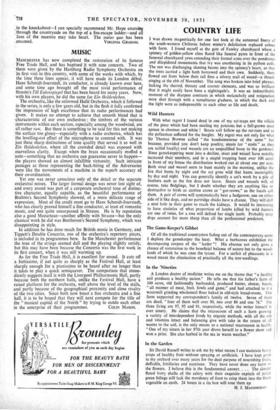MUSIC
MANCHESTER has now completed the restoration of its famous Free Trade Hall, and has baptised it with nine concerts. Two of
them were given by the Hamburg Radio Symphony Orchestra on its first visit to this country, with some of the works with which, by the time these lines appear, it will have made its London debut. Hans Schmidt-Isserstedt, its conductor, is already known over here, and some time ago brought off the most vivid performance of Strauss's Till Eulenspiegel that has been heard for many years. Now, with his own players, he did the same for Ein Heldenleben.
The orchestra, like the reformed Halle Orchestra, which it followed in the series, is only a few years old, but in the flesh it fully confirmed the impression of high excellence that its radio performances had given. It makes no attempt to achieve that smooth blend that is characteristic of our own orchestras ; the timbres of the various instruments within each section, especially among the woodwind, are all rather raw. But there is something to be said for this not making the surface too glossy—especially with radio orchestra, which has the levelling-out effect of the microphone to contend with. It was just these sharp distinctions of tone quality that served it so well in Ein Heldenleben, where all the crowded detail was exposed with marvellous clarity. Except when• the brass occasionally muffed a 'note—something that no orchestra can guarantee never to happen— the players showed an almost infallible virtuosity. Such intricate passages as those representing the back-biting of the Adversaries were like the movements of a machine in the superb accuracy of their co-ordination.
Yet one was never conscious only of the detail or the separate orchestral noises. The larger formal design was never lost sight of, and every sound was part of a corporate orchestral tone of distinc- tive character, equally capable, as the beautiful performance of Brahms's Second Symphony showed, of a more delicate range of expression. Most of the credit must go to Hans Schmidt-Isserstedt, who has clearly proved himself a fine conductor, at least of romantic music, and one quite unsurpassed in Strauss. He is by reputation also a good Mozartean—another affinity with Strauss—but the only classical work be did was Beethoven's Second Symphony, which was disappointing in style. In addition he has done much for British music in GerMany, and Tippett's Double Concerto, one of the orchestra's repertory pieces, is included in its programmes here. In the Manchester performance the tone of the strings seemed dull and the playing slightly untidy, but this may have been because the Concerto was the first work in its first Concert, when it was still warming up.
As for the Free Trade Hall, it is excellent for sound. It cuts off a fortissimo, if not quite as sharply as the Festival Hall, at least sharply enough for a pianissimo to be heard after no longer than it takes to play a quick semiquaver. The comparison that imme- diately suggests itself is with the Liverpool Philharmonic Hall, partly because both the northern halls, unlike the Festival Hall, have a raised platform for the orchestra, well above the level of the stalls, and partly because of the geographical proximity and close rivalry of the two cities. Since both now boast a fine orchestra and a fine hail, it is to be hoped that they will next compete for the title of the " musical capital of the North " by trying to outdo each other
in the enterprise of their programmes. COLIN MASON.


































 Previous page
Previous page